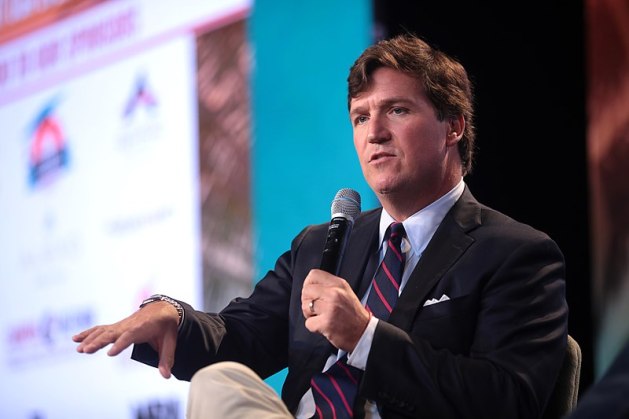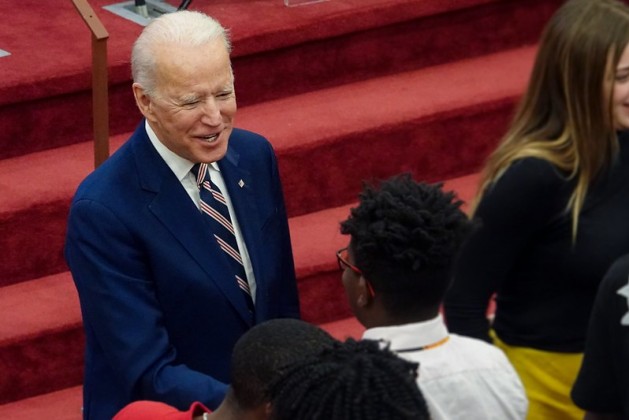
Tucker Carlson. Photo (cc) 2018 by Gage Skidmore.
Previously published at GBH News.
With the delta variant spreading and COVID-19 rates climbing in all 50 states, President Joe Biden last Friday offered some tough words for Facebook and other social media companies that are enabling lies and misinformation.
“They’re killing people,” he said. “I mean, look, the only pandemic we have is among the unvaccinated. And they’re killing people.”
Biden was not wrong. But despite the enormous reach of Facebook, only one media outlet has devoted itself to injecting falsehoods about the pandemic into the nervous systems of its audience on a 24/7 basis. That, of course, would be Fox News, the right-wing cable station that tells its viewers, over and over, that vaccines are dangerous and that wearing a mask to prevent COVID-19 is ineffective — and, in any case, is not worth the price we’d pay in giving up our freedom.
Anne Applebaum, a staff writer for The Atlantic, put it well in a tweet reacting to Biden’s warning to Facebook and its ilk: “Surely Fox poses as big or even bigger problem?”
Consider a recent exchange between Fox’s biggest star, Tucker Carlson, and Alex Berenson, a former New York Times reporter and frequent Fox guest who’s become a notorious purveyor of pandemic falsehoods. “Masks are useless,” Berenson said, although he added that an N-95 medical-grade mask might be of “some minor benefit.” Mainly, he said, mask directives are “symbolic,” explaining, “If I don’t see people wearing masks I forget to be scared, and that’s why they want people wearing masks.”
Berenson wasn’t done. In response to gentle prodding by Carlson, he said, “The vaccines unfortunately appear to be declining in effectiveness very quickly.” He complained that he’d been suspended by Twitter for saying just that, and he urged Carlson’s viewers to subscribe to his Substack “before I get kicked off Twitter.”
Carlson responded by appearing to agree with Berenson. “The big media outlets are committed to lying and censorship,” he said sympathetically. “It’s terrifying.”
Carlson’s show is the top-rated program on cable news, drawing some 3 million viewers every weeknight. That may pale in comparison to the reach of social media. But unlike Facebook, where you’re going to encounter news about your family and friends, cat photos and the like along with the occasional falsehood, Fox is pushing this stuff at all hours of the day and night.
As CNN media reporter Oliver Darcy put it: “Rupert Murdoch, who was among the first in the world to receive a coronavirus vaccine, but who pays people who intentionally fear-monger to millions of people about them, must be smiling about all the attention Facebook is getting. Facebook is allowing for the spread of misinfo, but at least, unlike Fox News, has made some effort to reduce it.”
From “Fox & Friends” in the morning to Carlson, Sean Hannity and Laura Ingraham at night, Fox in recent years has morphed from a somewhat normal conservative news and opinion outlet into pure propaganda.
Last week, Media Matters for America released a study that showed the extent of Fox’s disinformation campaign about COVID and vaccines. Media Matters is liberal and partisan, but it also has a reputation for getting its facts right. The findings were sobering.
“From June 28 through July 11, 57% of segments about coronavirus vaccines on the network included claims that undermined vaccination efforts,” according to the report. The biggest offender was the “Fox & Friends” morning show, followed by Ingraham, though Carlson wasn’t far behind.
During the two-week period, the report said, “Fox personalities and guests made 216 claims undermining or downplaying vaccines or immunization drives. Out of those, 151 claims came from pundits on the network, which represented 70% of the total. Fox pundits described vaccine efforts as coercive or government overreach 103 times and described vaccines as unnecessary or dangerous 75 times.”
This is pure poison, and it goes a long way toward explaining why Trump supporters are lagging on vaccinations, and why we’re all wondering how soon we’ll be under a mask mandate once again.
The Washington Post and Time magazine weighed in earlier this month with in-depth profiles of Carlson, who has become perhaps the most influential force in right-wing politics since the semi-departure of Trump and the death of Rush Limbaugh. Both profiles focused on his racism — a worthy subject, for sure, but no doubt a sign that the stories were assigned before the recent resurgence of the pandemic.
Gillian Laub of Time, though, did manage to work in some key COVID-19 material into her piece, eliciting a ludicrously offensive answer from Carlson when she asked if he’d been vaccinated. He called the anodyne question “super-vulgar” and parried with “What’s your favorite sexual position and when did you last engage in it?”
Laub also noted that, early in the pandemic, Carlson took COVID-19 more seriously than his fellow Fox hosts and even urged then-President Trump to change course. As a result, researchers found that Carlson’s viewers modified their behavior in practices such as hand-washing sooner than did Hannity’s fans.
There are some recent signs that Fox is hedging its bets. Steve Doocy of “Fox & Friends” has been praised for pushing back against his anti-vaxxer co-host Brian Kilmeade. (Both sides!) Even Hannity has been edging toward encouraging his viewers to get vaccinated. But it’s Carlson with the most viewers and influence, and there’s little evidence that his bosses are going to intervene.
Is there anything that can be done about the toxic influence of Fox News? It would be exceedingly difficult. Occasionally you hear some talk about reviving the FCC’s fairness doctrine, which required broadcasters to air opposing views and offer equal time to those who had been attacked. But even if that were politically possible, it would be unlikely to pass constitutional muster. The fairness doctrine applied only to over-the-air television and radio, not cable TV, since the airwaves were regarded as a finite, publicly owned resource.
In any case, such a heavy-handed approach might not be necessary. Congress could require cable providers to offer à la carte service so that no one would have to pay for Fox News or any other cable channel unless they wanted to. No more bundling. Personally, I’d probably keep Fox so I could check in on what they were saying from time to time. But I’d happily give up the 57 flavors of ESPN I’m forced to pay for and rarely watch.
For now, though, we’re stuck with Fox and the baleful influence it exercises over our entire culture. People are literally dying because of the false beliefs they harbor about COVID-19, and Fox is one of the principal vectors for spreading those beliefs.
Donald Trump himself has urged people to get vaccinated. But that’s not the message being delivered to the Trump supporters who tune in to Fox News every day. As a result, some 47% of Republicans say they are unlikely to get the shots, according to a Washington Post-ABC News poll, compared to just 6% of Democrats.
Over the course of the next few weeks, more people will get sick and more people will die. We may be told to wear masks in public once again. New restrictions may be put in place. We were so close to beating COVID-19, and now we’re moving backwards. For that you can thank Tucker Carlson, Laura Ingraham and the rest of their ilk at Fox.
Most of all you can thank Rupert Murdoch, for whom misery and disease is just another profitable day at the office.










